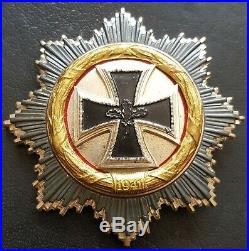
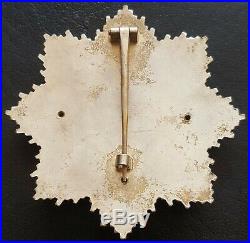
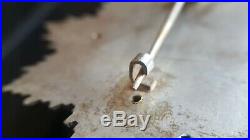
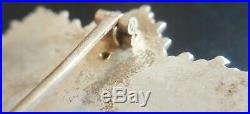
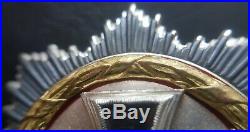
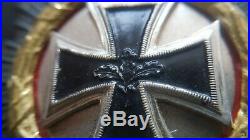
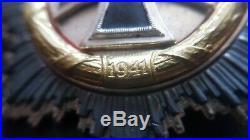
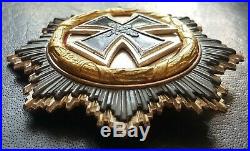
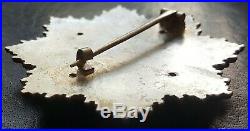
Original German Cross in Gold post WW2 (1957 PATTERN) – no swastika, STEINHAUER UND LUECK (ST&L) MADE LATER EXAMPLE WITH OPEN HINGEBLOCK – PERFECT PIN DEVICE, GOOD RIVETS, VERY NICE CONDITION – A GOOD PIECE. FEW FACTS ABOUT THE 1957 PATTERN AWARDS. In 1957 the West German government authorised replacement Iron Crosses with an Oak Leaf Cluster in place of the swastika, similar to the Iron Crosses of 1813, 1870, and 1914, which could be worn by World War II Iron Cross recipients. The 1957 law also authorised de-Nazified versions of most other World War IIera decorations (except those specifically associated with Nazi Party organizations, such as SS Long Service medals, or with the expansion of the German Reich, such as the medals for the annexation of Austria, the Sudetenland, and the Memel region). The main government contract to manufacture and supply these new de-nazified WW2 1957 official decorations went to the world famous German firm Steinhauer & Lueck, Luedenscheid Germany. Knights Crosses, Iron Crosses , Wound Badges, Tank Assault Badges etc were re-designed by Steinhauer & Lück – often with the oak-leaf spray replacing the swastika, with S&L having the sole patent rights to all WW2 1957 German decorations. S&L did not have the whole monopoly on medal making, other famous firms such as Deschler & Sohn, BH Maher and Juncker also manufactured these new German decorations. Lüdenscheid is situated between the cities Dortmund and Bonn. It was here that one of the youngest medal firms was founded in 1889 by August Steinhauer and Gustav Adolf Lück. The first production began in a cellar, the customer base continued to increase. A property was bought at 51 Hochstrasse which is still home for this famous company today. During WW2 Steinhauer & Lück produced medals and badges, like the famous Knights Cross and many other types of medals and badges. In 1957 this company was awarded the contract to produce all the newly re-designed legal WW2 1957 de-nazified decorations, plus the contract to manufacture all of Germany’s official decorations including Germany’s highest order the Bundesverdienstkreuz. Only a very limited number of original WW2 1957 medals are still produced, mainly Iron Crosses, German Cross Gold & Silver & Wound Badges and are considered 100% genuine by the German Government. HISTORY OF THE AWARD. The German Cross (German: Deutsches Kreuz) was instituted by Adolf Hitler on 16 November 1941 as an award ranking higher than the Iron Cross First Class but below the Knight’s Cross of the Iron Cross. The German Cross was issued in two degrees: gold and silver (the color of the laurel wreath around the swastika), the former being an award for bravery, the latter being for distinguished service and was considered a continuation of the War Merit Cross with swords. The German Cross was unique in that the Gold and Silver degrees were considered as separate awards but should not be worn simultaneously. However, pictures of recipients wearing both grades exist. There are a total of 11 recorded instances of a recipient receiving both the German Cross in Silver and Gold during the war. A special grade, the German Cross in Gold with Diamonds, was manufactured towards the end of World War II but was never bestowed. The medal consists of a star badge, containing a swastika (in German, Hakenkreuz, “hooked cross”, which gives the award its name, the “German cross”). It had a diameter of 6.5 cm and was worn on the righthand pocket of the tunic. If a recipient was awarded both the silver and gold divisions, both of them could be worn on the uniform. This award was also available in cloth form, which made for easier wear on the combat uniform; Helmuth Weidling wore this variety during his defense of Berlin in April-May 1945. Far more awards in gold (combat) were made than in silver (support). The cross title refers to the fact that the swastika is a cross, a sun-cross. In 1957 an alternative version for replacement of the German Cross was implemented. It features a Iron Cross in place of the swastika, whose display was banned in Germany, and later in many other European countries, after the war. Veterans who had earned the medal during the Third Reich were unable to wear it on formal occasions, before this change. The design of this decoration was executed by Professor R. Klein of Munich and the first examples were made by the DESCHLER firm of Munich. The first prototypes contained 10 rivets, with a system of attachment typical of the Iron Cross of 1914. To begin with, the DESCHLER firm used 6 rivets, then from from about the middle of 1942 onward, only 4. The base piece consists of a silver star with eight rays, upon which is fixed another star with eight rays, lighter and smaller, in a dark gray color. A silvered disk bordered with two red bands is placed above. A swastika in black enamel bordered silver is fixed on the disk by means of two or four prongs situated on the ends of the arms. Between the two red bands is found a gilt or silvered wreath. The year 1941 is embossed at the base of the wreath. The wreath is fixed with four rivets. In some cases the wreath rivets maintain the whole cross (ex Zimmermann), in other case they just hold together the wreath , the circle and the black star. The hinge itself may be a bent piece of metal soldered in a recess at the top of the star (types marked 20, 134, DESCHLER), or more simply, soldered directly onto the star (Juncker and Godet types). The pin is fixed to the hinge by a cross-pin. The construction of this decoration is the most complex of all the military decorations of the Third Reich. The item “8556 German Cross Gold medal 1957 pattern Deutsches Kreuz post WW2 maker ST&L” is in sale since Sunday, July 28, 2019. This item is in the category “Collectables\Militaria\World War II (1939-1945)\Medals/ Ribbons”. The seller is “a..anderson” and is located in Abbots Langley. This item can be shipped worldwide.
- Country/Region of Manufacture: Germany
- Country/ Organization: Germany
- Issued/ Not-Issued: Issued
- Type: Medals & Ribbons
- Conflict: World War II (1939-1945)
- Era: 1914-1945